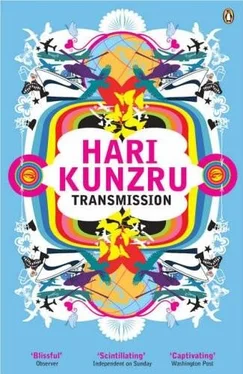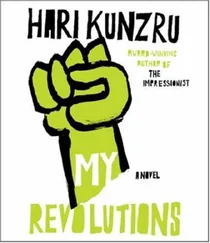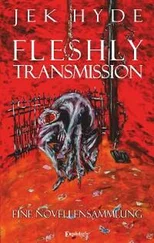She wondered how she was supposed to work. More journalists than ever were camped at the gate. The local police had arrested several ‘rowdy Asian youths’, and one or two of the tabloids had picked up the story of Leela’s illness, running reclusive-star stories on the inside pages as part of their coverage of the global cyber-terror alert.
Threat level was up. Markets were down. Rajiv Rana rang her room to ask if she would like to have lunch with him on Skye.
She agreed, on condition he first came with her to meet the press. When the Testarossa roared down the drive, there was a minor commotion, and she realized uncomfortably that, at least for the Indian media, she had just committed the cardinal public-relations sin of making herself part of the story. Rajiv charmed people and signed autographs. She dodged cameras and struggled to maintain the pretence that there were no production problems. Again and again journalists tried to make a link between the virus and the girl. Could Gaby categorically confirm that it wasn’t a publicity stunt gone wrong? Were they really expected to believe that Ms Zahir and her backers were in no way connected with the dissemination of her image around the globe?
She promised more later and told Rajiv that lunch was off. With things as they were, she would need to spend the afternoon on the phone. Would he drive her back up to the Lodge? Sure, he said. She got into the Ferrari’s passenger seat. He grinned, gunned the engine, screeched through the crowd and turned on to the main road.
She told him to turn the car around. He reached across her into the glove compartment and put on his shades. She shouted at him, called him irresponsible. He switched on Simply Red and sang along. She insulted his music taste in English, Italian and Parisian verlan , and then, having run out of options, sulked. Above them the wind rolled balls of cumulus cloud across the sky, rotating light and shadow over the water around the Skye Bridge. The wind whipped at her hair and soon she was smiling through her irritation, enjoying the sights: black-faced sheep grazing on the island’s rough moorland, shaggy incurious cattle penned at the side of double-glazed stone cottages.
They cut away from the main road and walked across a field strewn with plastic bottles and pieces of fishing net to look at the view from a line of sea cliffs. He took hold of her hand and shot her a smouldering look. ‘You’re not at work now,’ she told him. He laughed and said he was just practising. Then he drove her across the island to a restaurant in an old croft where all the tables were full of people with English accents and apart from the sky and the hills outside the window she could have been in London. He talked constantly, and, though he was preening and self-obsessed, it was refreshing to be with him. He made her feel far away from herself, from the mud dragging at her heels.
He drove her back in time for dinner at the hotel, and the crew pretended not to watch as India’s former number-one action hero followed the foreign woman up to her room.
Sex funnelled up between them with sudden violence. He ground his face against hers, his stubble raking her lips and cheeks as they struggled towards the bed. She sank her nails into his neck, and he tugged her skirt up around her waist, digging between her legs with a hand. Every action was forceful, angry. As he threw her down she caught sight of his face and she could tell he wanted to hit her; and at that moment part of her wanted him to do it too, to confirm her insubstantiality, her potential for vanishing. She came almost immediately. Five minutes later Guy phoned.
‘Sweetie?’

For Rajiv Rana, sex these days was primarily about relieving tension. If you are famous for your calm under pressure (when being attacked by a gang of lathi-wielding thugs, for example, or hanging from your fingernails beneath a collapsing suspension bridge), it may be important for your public persona to mirror your on-screen one. The emotional vocabulary of the action hero is limited. No tantrums. No weeping. You must face adversity with a witty one-liner and a left hook.
INSPECTOR KHANNA
(smiling ironically)
You know you shouldn’ t smoke… It’s bad for
the health.
ZEBISCO’s car explodes in a ball of fire.
For almost fifteen years Rajiv Rana had played himself to the hilt, at parties and shows, at openings and premières and charity auctions and political rallies. He was a professional. He was smooth. He was pent-up.
He was scared.
A crowd shouting his catch-phrase.
You… shouldn’t… smoke!..
His voice echoing in a hotel bathroom, cornered and hollow.
‘Baba, how good to hear you. All the way from Dubai. I am honoured. And your health?’
Film heroics mean nothing here. Speak to Baby Aziz on the phone and your mouth goes dry. It’s partly the stories from the old days, the Mumbai street days. A garland of severed fingers. A broken-limbed tycoon left to crawl along the sea wall of Marine Drive. The shootings, the faces burned with acid — all that belongs to the past now. It must be a long time since the man at the other end of the line did anything more physical than lift his portly frame on to a sun-lounger. But memories underwrite the present, guarantee that in these hands-off times of hawala couriers carrying money from the Far East, fixed cricket matches in Durban, apartment complexes in the Gulf and RDX caches in Azad Kashmir, you will hear his wheezy beedi-smoker’s voice and remember that you too, despite your money and your millions of fans, lie within his sphere of influence.
‘So a party. Your parties are famous. How many ladies at this one, eh?’
Aziz laughed a thin perfunctory laugh and, although this was not the question he had been asked, dropped the names of several famous men who were at that moment enjoying his hospitality. A fast bowler. The head of a soft-drinks company. In the next room, getting his cock sucked, was a member of one of the Emirates’ ruling houses. Aziz was pleased. The next room. I could hold the receiver up, eh? This was the kind of thing he enjoyed. He was remarkably indiscreet.
‘Speak up,’ he told Rajiv. ‘There’s a strange noise on the line.’
Then he got down to business.
Baby Aziz had not always owned Rajiv Rana. A film star can exert muscle of his own when dealing with the underworld. Producers are used to extortion attempts, and, though sometimes it is better to pay a little protection money for a shoot to go smoothly, there are ways of staying clear of Mumbai’s dark side. It is difficult, but possible. At least until you do something wrong. Until you accept a favour.
Rajiv’s descent began with a little customs trouble, a matter of some undeclared currency and an overzealous commissioner who didn’t have time to go to the movies. With a possible court case looming, Rajiv was looking at a big fine instead of a new jeep, a state of affairs which left him sulky and prone to tetchiness on the set of Hit Man Hindustani. He complained loudly enough to be heard by a certain Mr Qureishi. His business card described him as a lawyer, but he spent most of his days at a corner table in a Bandra restaurant taking bets on sports fixtures. Qureishi saw a way round Rajiv’s problem, and, sure enough, in return for a donation to a charity helping destitute slum girls, the commissioner’s zeal faded and the star was able to drive around town with the wind in his hair.
Rajiv was grateful, and more than happy to lend a little glitter to Qureishi’s daughter’s wedding. There he was treated royally and had his picture taken with some other people who turned out to be just as helpful as Qureishi himself. Whether it was accurate stock-market predictions, cheap imported Scotch or introductions to Alitalia stewardesses keen to get to know the real Mumbai, Qureishi’s friends seemed to be able to make Rajiv’s life better in small but meaningful ways. They loved having him around because he was Rajiv Rana, and he accepted that as his due.
Читать дальше












